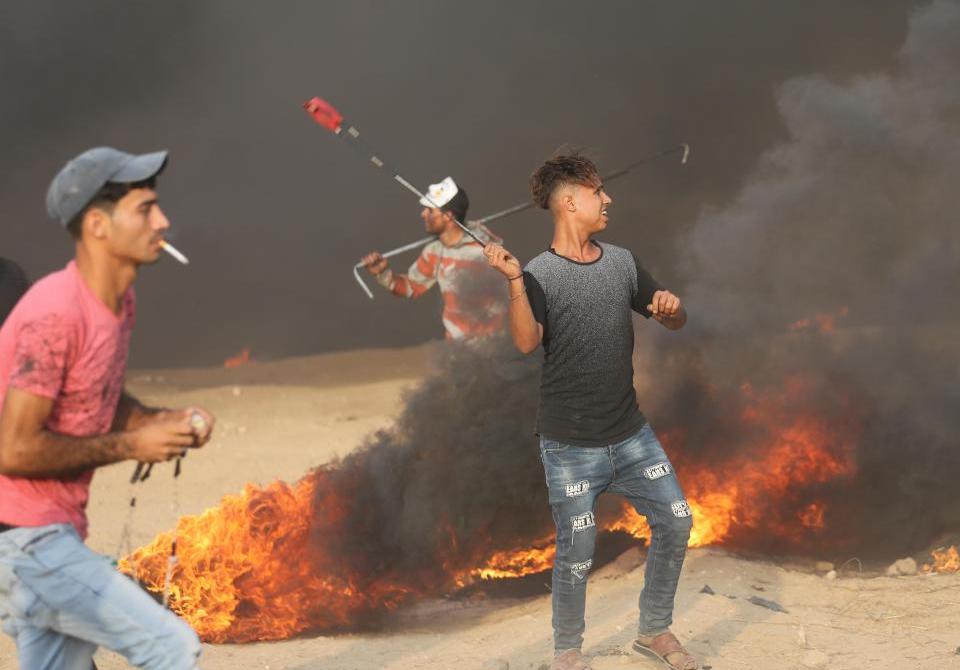Gaza is at the forefront of Palestine’s pain

Gaza is at the forefront of Palestine’s pain, and the priority of political and humanitarian calculations alike
It occupies the most extensive areas on the maps of Palestinian and regional political balances and is considered one of the pillars of international polarisation regarding managing the conflicts in the region.
Gaza, which represents the essence of the Palestinian political situation at this point in time, holds all the strings of the cause, the issues of which are intertwined within each other. The Palestinian -Palestinian reconciliation, the truce with the occupation, the UNRWA crisis, the disputes over the form and type of resistance, the organisation of Palestinian legitimacy, and other issues, all involve Gaza.
The status of Gaza was expressed by UN Special Coordinator for the Middle East Peace Process, Nickolay Mladenov, during his monthly report to the UN Security Council at a meeting on the Middle East last Thursday, October 18th, as Gaza takes the lion’s share of his monthly briefings.
The briefings go beyond the language of reporting information and data, reaching the language of appealing and urging, as he stated “the urgency of the situation that we face on the ground is desperate – Gaza can explode any minute,” especially as the calmness is fragile and decisive measures must be taken. He sounds the alarm, indicating the presence of danger that could have repercussions outside of the Gaza Strip.
Mladenov has clearly described the gravity of the situation in Gaza, pointing out that the consequences will be very severe in the event of failure to achieve a truce. He noted the possibility of being dragged into a cycle of war if measures are not taken to stop the deterioration and if the state of tension in the region returns.
The UN official’s discourse includes a level of insistence on not abandoning Gaza, stressing that the issue is not only humanitarian but also political. He urges all Palestinian parties, especially the Palestinian Authority, not to do so.
He does not disregard the essences of the problem, which lies in the occupation’s imposition of a blockade on Gaza, despite not implicitly stating this. He did, however, call on the occupying state to ” restore the delivery of critical supplies to Gaza and improve the movement and access of goods and people [and] exercise maximum restraint in the use of live ammunition,” when dealing with the protestors on the eastern border.
In the context of his call to work to prevent terrible consequences, he talks about efforts to resolve the UNRWA crisis. He thanked Qatar for its immediate and generous response by providing $60 million to buy fuel to increase electricity supply to the Gaza Strip, in addition to some countries pledging to provide $122 million to the Agency.
“The endless cycle of emergency responses and stop‑gap measures must be broken, with the Palestinian people accorded a sustainable and just solution that allows them to be masters of their own fate living in peace and security with Israel, without walls of occupation,” added Mladenov.
He also said that the Palestinians deserve the chance to regain their dignity and to build a better future for themselves, noting that they deserve the right to self-determination and be governed by democratically elected institutions. He also noted their right to have a state in which they live in peace and security with Israel, without the occupation’s walls, fear of reprisal or displacement, and without fearing to live their whole lives fighting an endless struggle.
The details of the other Palestinian suffering are not less severe or important. Mladenov allocated part of his briefing to Israel’s blatant violations, including its continued demolition of Palestinian buildings and properties in the West Bank, in addition to the occupation’s relentless campaign to destroy Al-Khan Al-Ahmar in Jerusalem.
The UN official pointed out Israel’s allocation of funds to build settlements in Hebron, stressing the illegality of this activity, without reducing the danger of settler practices and attacks on Palestinians, which he considers a source of concern.
Perhaps Mladenov’s words in his briefing on the Palestinian situation addressed many of the focuses and issues of the daily Palestinian suffering, both systematically and professionally, and may have sought to get as close as possible to facts that reveal the bitter reality of the Palestinian cause. However, it is a very brief form of describing the Palestinian situation.
Attempting to address the situation in the Palestinian territories would require a state of deep understanding of the pulse of the suffering of the Palestinian individual. This is helped by looking into the details of the humanitarian distress suffered by the children of Gaza, the West Bank and Jerusalem, day and night. It is also helpful to explicitly identify the cause of such chronic suffering and to openly hold them responsible.
What is required of the UN officials, who convey the image of the tragedy of the Palestinian people to the international community, resulting from the political repercussions of the occupation’s practices, is to identify, in a genuine, accurate and frank manner the cause of this tragedy, i.e. the occupation, the occupation and occupation. We understand and keep in mind the considerations of diplomatic work and the fact that it requires a moderate tone under various pretexts, including preserving a sense of balance in position, in order not to provoke parties allied with the occupation that largely control international decision-making.
However, we firmly believe that the Palestinian situation cannot bear many interpretations, as the core of the issue is the occupation’s frantic attempts to deprive the Palestinians of their rights. Therefore, the international community must hold the occupation legally and morally responsible for its continued violations against the Palestinian people and put an end to them.
Source: Middle East Monitor

WRITE YOUR COMMENT